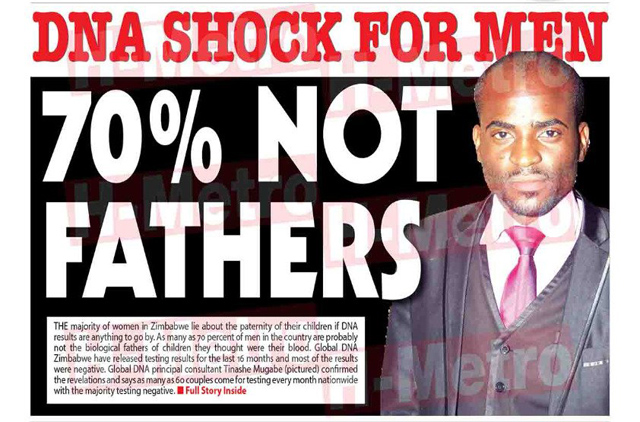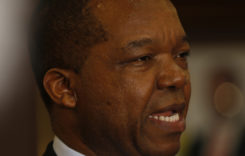
CLAIM: About 70 percent of Zimbabwean men are taking care or providing for children who were misidentified as theirs either deliberately or due to human error.
CONCLUSION: False
Explainer: The claim lacks context.
Researched by Lifaqane Nare
- The claim has been surfacing in local media since 2015
- The source of the statistics are DNA testing companies and judiciary reports on maintenance claims
- The samples are biased and drawn from a small base that is not representative of the population of interest
Most recently, an official with Expedite DNA Zimbabwe, Chapo Lunga, claimed in the Sunday News of 9 June, 2019, that ‘about 60 percent of Zimbabwean men are taking care or providing for children who were misidentified as theirs either deliberately or due to human error’.
This claim around paternity discrepancy/fraud is not a new one in Zimbabwe. It has been made, on average, once a year since 2015 to 2019. The claims are usually made by the media and DNA testing companies.
‘Not their children’
The claims over the years have ranged from 30 to 72 percent of fathers who are looking after children who are not theirs.
In 2015 , The Herald newspaper ran a story with the claim that ‘72 pc men duped on paternity’.
In 2016, The Daily News had a story with the claim that ‘over 70 percent of women who claim maintenance from alleged fathers were paternity cheats’.
In 2018, there were two such stories – one from H-Metro and the other from the Sunday News.
The H-Metro claimed that ‘as many as 70 percent of men in Zimbabwe are probably not the biological fathers of children they thought were their blood’.
The Sunday News claim was that ‘more than 30 percent of Zimbabwean men may be taking care of children who are not theirs as cases of paternity fraud continue to soar in the country where mothers deliberately misidentifies (sic) the biological father of the child’.
The Sunday News carried another story, the latest one on June 9 (2019) with the claim that ZimFact is fact checking here.
What’s wrong with this picture?
The media stories on paternity fraud are largely based on figures from DNA testing companies and maintenance court cases.
This means that the sample is drawn from men who already have doubts concerning the paternity of their children. The sample is, therefore, not representative of the population as a whole as it is very small and biased since the data heavily relies on men who already have a reason to have suspicions. The source of the statistics, the DNA testing companies, also have a commercial interest in pushing this narrative.
The Sunday News identifies Expedite DNA Zimbabwe as a non governmental organisation when it is a biotechnology company.
The Herald story speaks of a sample of 11 men directed to DNA testing by the courts as a result of maintenance claims disputes over a period of six months. Of these, 72 percent of the DNA tests were negative for paternity.
The H-Metro story is based on figures from one DNA testing company, Global DNA.
In the story, the company consultant says they handle between 50 and 60 cases per month and of these, 60-75 percent of cases come back negative.
The Sunday News stories both use the same source, Expedite DNA, which claim a percentage of 30% in December 2018 and 60% in June 2019, which would be a 100% increase in 6 months in the number of fathers raising children not their own.
Sampling experts Charles A. Ramsey and Alan D. Hewitt argue that ‘assessing sample representativeness is a critical component of any environmental investigation and should be performed before any conclusions are reached. If the samples are not representative, any conclusions or decisions will be incorrect’.
What’s in it for DNA testing companies?
The DNA companies run a business and it is in their best interests to encourage people to go for paternity tests.
According to Expedite DNA Zimbabwe’s Facebook page, a prenatal invasive DNA test costs US$500 and the non invasive one US$1500, while the general paternity tests is US$215. The adverts for these services are accompanied by statements such as, ‘Men can never truly guarantee if they are the biological fathers of children without undergoing paternity tests. Expedite DNA Zimbabwe is here to give you peace of mind with affordable dna testing’.
Global DNA Zimbabwe also offers services on their Facebook page. A Happy Father’s Day message on the page asks the question; ‘Is your child yours? Ziva chokwadi (know the truth)’.
Contacted for comment, Ms Lunga confirmed that her statement is based on statistics of people who come through their laboratory for paternity testing and said she would not know how representative it is of the larger population.
A website that deals with paternity fraud cautions against using these kind of statistics to generalise for the entirety of the population, ‘As to the frequency of paternity fraud, then there are no clear figures and one should be aware of often misquoted data from mis-paternity studies where subjects had a reason to take the DNA test. These statistics are valid in their own right but are not applicable to paternity fraud. The emotive headlines we often see in the popular press, which potentiate the urban myth of increasing paternity fraud in UK society, does us all little service and there is no verifiable evidence that paternity fraud is on the increase. However, it does occur.’
An article in a journal on measuring paternal discrepancy and its public health consequences, says it should be noted that the figures of paternal discrepancy in disputed paternity are higher than in populations testing for reasons other than disputed paternity.
“For disputed paternity tests median levels of PD across 16 studies is 26.9% (interquartile range (IQR) = 16.7%–33.4%). However, being based on cases where PD was already suspected this inevitably overestimates population levels. For studies based on populations chosen for reasons other than disputed paternity, median PD is 3.7% (IQR = 2.0%–9.6%). While this is not a measure of population prevalence it does suggest the widely used (but unsubstantiated) figure of 10% PD may be an overestimate for most populations”.
Conclusion
The claim that about 70 percent of Zimbabwean men are taking care or providing for children who were misidentified as theirs either deliberately or due to human error is rated FALSE, because it lacks context.
This claim is only true of men who have used the services at Expedite DNA Zimbabwe to check the paternity of the children they are providing for. However, the statistics are presented as if they are representative of all Zimbabwean men as a population. The sample is not representative enough as it is too small and based on the reports of one agency.
Do you want to use our content? Click Here











